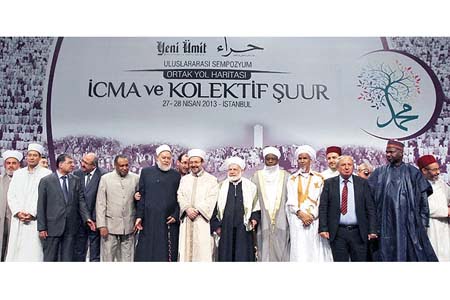Scholars stress need for dialogue, cooperation to solve global issues

Date posted: April 29, 2013
DERVİŞ GENÇ, AYTEN ÇİFTÇİ
A two-day symposium during which Islamic scholars from 80 countries exchanged views about ijma, an Islamic term meaning religious consensus, took place in İstanbul over the weekend with participants discussing methods of achieving consensus and stressing the importance of solidarity and cooperation in solving global problems.
The event, which was jointly organized by the magazines Yeni Ümit and Hira, took place at İstanbul’s Haliç Congress Center on the Golden Horn. The symposium was titled “Ijma as a Common Roadmap and Collective Awareness.”
Among the speakers of the event were Professor Ahmed Abbâdi, Muhammed Saad Ebu Bekir, former Egyptian Mufti Professor Ali Gomaa, Professor İsam Beshiri, Professor Muhammad Imara and Islamic scholar Selmân Hussein en-Nedvî and Cairo University political science professor Saif Eddin Abdel Fattah.
A total of 4,000 people followed the symposium. There were simultaneous translations in five languages — Turkish, Kurdish, Arabic, English and French — during the event.
The editor-in-chief of Yeni Ümit magazine, Ergun Çapan, earlier said the symposium would be the sixth such event they have organized.
Çapan noted that the theme of this year’s symposium was proposed by well-known Islamic scholar Fethullah Gülen.
Among the participants of the symposium there were also opinion leaders from Turkey’s east and Southeast.
The head of Turkey’s Religious Affairs Directorate, Professor Mehmet Görmez, was among the figures who made opening speeches on the first day of the event on Saturday.
In his speech, Turkey’s top imam listed three stages of reaching to a consensus in Islam: Determining the main principles of the religion, understanding an issue correctly and conveying the issue to others correctly. He further said that ijma will continue to act as a shield against the efforts to reform the religion until doomsday. Muslims in all parts of the world, from Kazan and Timbuktu to Marrakesh and Kuala Lumpur, speaking different languages and living in different cultures use the same sources to learn about their religion, Görmez noted.
“The Islamic community has two main responsibilities regarding ijma. The first is to stick to the basic principles determined by ijma and not allow for subjective tendencies that harm this framework [determined by ijma]. The second is to practice the principle of precedent, which is essential in solving issues regarding the future, and to have a consensus over the precedents accepted as widely as possible,” the professor said. He also added that ijma has historical and legislative functions. The first function is the most important as it is the key to forming a common Muslim identity, he stated.
The Turkish Islamic scholar Gülen sent a message that was read during the symposium, saying “It is the expectation of everyone that the scholars participating in such an exceedingly important event offer alternative solutions based on our basic sources to our centuries-old chronic problems.”
Speaking on the second day of the event, Egyptian Professor Imara said that ijma protects Muslims from separation and conflict and it keeps them united. The Hizmet movement, inspired by Gülen, also contributes to this, he noted.
Another speaker, Professor Beshiri, stressed the importance of solidarity, saying that an individual is weak when alone but becomes stronger when acting with brothers and sisters.
Hira magazine’s Editor-in-Chief Nevzat Savaş said in his speech that the Islamic world has good and solid ideas, but Muslims have difficulty in exchanging these ideas.
Yeni Ümit, one of the organizers of the event, is a monthly magazine on Islamic knowledge and literature. It reaches out to around 100,000 people every month. Renowned Islamic scholars Professor Hayrettin Karaman and Suat Yıldırım are among the members of the magazine’s advisory board.
Hira, the other organizer, is a magazine published in Arabic by Kaynak Publishing. It reaches out to people in many Islamic countries. Among the contributors to the magazine are many writers, thinkers and intellectuals from the Arab world. It is published as a quarterly.
Source: Today’s Zaman, 28 April 2013
Tags: Islamic World |
























